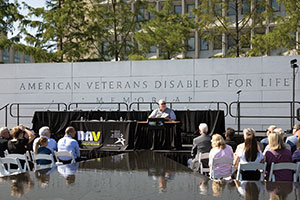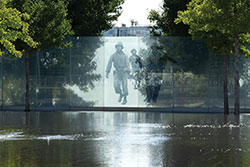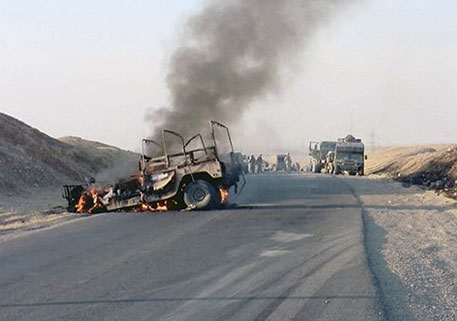
In 2014, Dennis Joyner—a DAV past national commander, combat-wounded Army veteran of the Vietnam War and triple amputee—bared his soul during the dedication ceremony for the American Veterans Disabled for Life Memorial.
Joyner was barely a month into his deployment to the Mekong Delta in Vietnam when a land mine explosion caused the loss of three of his limbs.
“[At the memorial ceremony] I admitted for the first time publicly that, at the time of my traumatic amputations, I had screamed to my fellow soldiers the words ‘Let me die!’” Joyner said. “I still vividly remember those moments.”
But his fellow soldiers never left his side and encouraged him to fight to stay alive.
More than a half-century later, as the president of the Disabled Veterans’ Life Memorial Foundation, Joyner spoke from the same spot he did in 2014 to commemorate the 10-year anniversary of the memorial that represents all veterans from all eras and branches who have been forever changed by their service. More than 100 invited guests attended the event co-sponsored by the DAV Department of Virginia.
“Some monuments and memorials get forgotten over time, but I don’t see that happening with this one,” said DAV Department of Virginia Adjutant Lisa Gregory. “I think it’s a part of us.”
During his speech, Joyner reflected on what the memorial has come to mean for him.
“Our memorial is a physical reminder of the human cost of war—a tribute to the sacrifices of past, present and future generations,” he said. “At the same time, it’s a testament to our resilience and resolve for justice. Justice for our brothers and sisters. Justice for our families. Justice for our survivors. It is a place of us, by us and for us.”

After Joyner spoke, attendees listened to a live dramatic reading of Sophocles’ “Philoctetes,” a Greek play written more than 2,500 years ago. Actors Chad Coleman, an Army veteran best known for his roles on “The Walking Dead” and “The Wire”; David Strathairn, Academy Award-nominated star of “Good Night, and Good Luck,” “Nomadland” and “Lincoln”; and Ato Blankson-Wood, a Tony-nominated Broadway actor who appeared in “BlacKKKlansman” and “Detroit,” performed alongside a chorus of veteran leaders from the DAV community who included Anthony Swofford, author of the book “Jarhead.” The reading was directed and facilitated by Bryan Doerries, founder and artistic director of Theater of War Productions.
Although an ancient text, the story of a wounded soldier stranded on an island and forced to deal with the effects of war resonated with the audience. Following the performance, Theater of War facilitated a guided discussion for attendees to reflect on the play’s themes and how they relate to modern-day veterans.
“I looked around the audience and saw people relating, saying ‘That’s like me; I dealt with that,’” Gregory said, adding that the veteran chorus helped drive that point home.
One of those veterans was DAV Assistant National Communications Director Kevin Miller, a Marine combat veteran. During the discussion, he compared Philoctetes’ rescuer, Neoptolemus, to the work DAV does. Neoptolemus stayed by Philoctetes’ side through his trials and injuries and helped him out of a terrible situation.
“You’ve got to continually engage with folks, no matter how much, how often or how long, to get them to where they actually need to be and live successful, sustainable lives,” Miller said.
Deb Olson, a department service officer and member of Chapter 85 in Malden, Massachusetts, attended the ceremony. Every time she’s in Washington, D.C., to speak with lawmakers as a DAV representative, she visits the memorial. With its close proximity to the U.S. Capitol, she likes to spend time there to remind herself why she advocates for veterans.
“It’s a place where people can go and just sit and think,” Olson said. “It’s a way to review and reflect on what we do to help.”
She said this visit was especially poignant because the guided discussion after the Theater of War presentation brought back memories of all the veterans she’s helped as a benefits advocate over the past 20 years.
For Joyner, the memorial represents more than the sacrifices of those who’ve served; it represents the ongoing effort to ensure promises are kept to veterans and their families. He praised DAV’s advocacy work over the past decade, which has made significant strides in ensuring veterans have the benefits and care they’ve earned from service.

“The historic wave of veterans returning from war to a nation ill-prepared to welcome them home is less likely to repeat itself now than in any previous time,” Joyner said. “We are stronger. We can clearly see progress in our combined efforts to help veterans confront the invisible injuries of war.”
The memorial, located at 150 Washington Ave. SW, Washington, D.C., is open to the public year-round. A virtual tour is available at avdlm.org.






